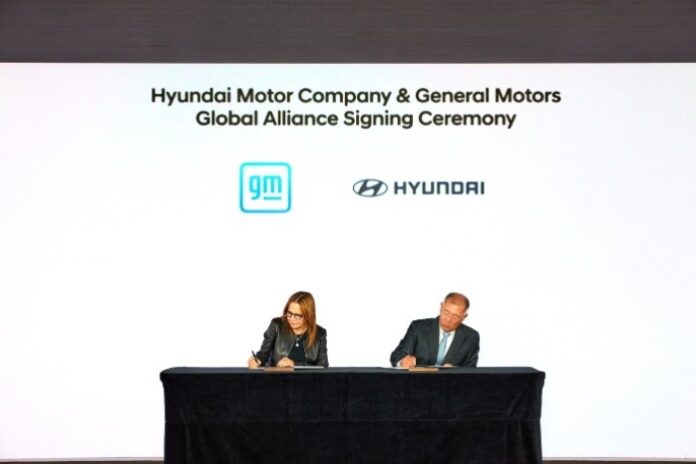General Motors Chair and Chief Executive Mary Barra (left) and Hyundai Motor Group Executive Chairman Chung Euisun sign a strategic alliance MOU (Courtesy of Hyundai Motor)
Hyundai Motor Co. and General Motors Co. are expected to soon announce a vehicle-sharing deal about six months after they signed an agreement for their broad strategic alliance.
Early Friday, Reuters reported that the two auto giants have nearly reached an agreement to share Hyundai Motor’s two electric commercial van models with GM, while the US carmaker, in return, might allow its Korean peer to sell its pickup trucks with the Hyundai badge in North America.
According to the report, the documents obtained by Reuters also show Hyundai is reviewing joint purchasing or development of computing chips, next-generation batteries and battery materials with GM.
In response to the report, Hyundai Motor said nothing specific has been determined yet, while GM declined to comment on details of the negotiations, saying “both companies continue to explore potential areas of collaboration.”
However, considering that Hyundai Motor said during its earnings conference call in January that it would strive to reach a final agreement on its anticipated joint projects with GM within the first quarter of this year, the two auto giants will likely unveil their specific alliance plans soon, industry observers said.
(Courtesy of Reuters via Yonhap)
Last September, Hyundai Motor Group’s Executive Chairman Chung Euisun and General Motors Chair and Chief Executive Mary Barra signed a memorandum of understanding (MOU) to form a strategic alliance between the two auto juggernauts, marking the Korean car giant’s first strategic partnership with a global finished carmaker.
At that time, they said they would explore ways to jointly develop new vehicles, resell another company’s car model under their brand, a widespread practice called car rebadging, and source raw materials for clean-energy cars together.
MORE DETAILS ABOUT THE PARTNERSHIP
The union of the world’s No. 3 and No. 5 carmakers is projected to be a win-win as GM is strong in the commercial vehicle, sport utility vehicle (SUV) and pickup truck sectors, while Hyundai Motor boasts powerful hybrid and EV lineups.
Their car sharing will enable the two carmakers to offset each other’s weaknesses and create synergies, mainly cost saving.
Reuters reported that Hyundai would produce EV vans to be sold under both its own and GM brands in a Korean plant and then import them to the US.
Hyundai’s all-new Santa Fe 2024 SUV wins an iF Design Award in March 2024
Hyundai may shift their manufacturing to North America by 2028 by building a new plant, adding production to an existing facility or contracting out the manufacturing, said the report, citing an undisclosed source.
GM is said to be considering allowing Hyundai to resell its midsized trucks, branded as the Chevrolet Colorado and GMC Canyon in the United States, with the Hyundai badge.
But their talks over the pickup sharing will likely take longer before reaching a final agreement than EV van sharing, considering that an option to allow Hyundai to sell GM’s popular full-sized pickups was not a part of their initial talks despite the Korean partner’s wish, according to Reuters sources.
TO COMBAT CHINA’S EV RISE
Their joint efforts are expected to help them ward off the ascent of Chinese rivals amid an electric vehicle market slowdown.
Chinese electrified cars are rapidly expanding their presence in the global auto market, while their European, US and Asian peers, mainly traditional combustion engine car manufacturers, lag behind the Chinese due to a delayed or shy investment in electrification.
The GMC Canyon (Screenshot captured from GMC’s website)
As the two partners plan to enhance their alliance in broad sectors, including future mobility technologies, their union should allow them to wield even bigger influence going forward, market analysts expected.
GM has 35 plants across the world. This means Hyundai Motor can produce its cars even in countries where it has no physical plants like Canada by using GM’s plants through their strategic alliance.
The American car giant can also produce its cars from Hyundai Motor’s plant. Such a move will cut costs for both companies.
Under their MOU signed last year, the two carmakers are also expected to join hands in the hydrogen fuel-cell sector.
Leveraging Hyundai Motor’s world’s best hydrogen fuel-cell technology, GM is expected to develop new fuel-cell cars.
Hyundai Motor started developing hydrogen motor technology in 1998 and introduced the world’s first hydrogen car model in 2013.
It rolled out the hydrogen-only model NEXO in 2018, and the XCIENT fuel-cell truck in 2020.
Write to Jung-Eun Shin at newyearis@hankyung.comSookyung Seo edited this article.


